Here are my favorite poems about sirens categorized:
- Famous poems about sirens
- Love poems about sirens
So if you want the best poems about sirens, then you’re in the right place.
Let’s get started!

Captivating Poems About Sirens
Dive into an extraordinary anthology of captivating poems about sirens, meticulously arranged for your delight.
From haunting verses that evoke the allure of these mystical creatures, to mesmerizing compositions that capture their enchanting melodies, discover the essence of sirens in one captivating collection.
Immerse yourself in the seductive power of their songs and explore the depths of their irresistible allure as you journey through this handpicked selection of poetic masterpieces.
Let the captivating verses of sirens transport you to a world of mystery and enchantment, where the melodies of these mythical beings come alive in your imagination.
Let’s jump right in!
My #1 Favorite Poem About Sirens
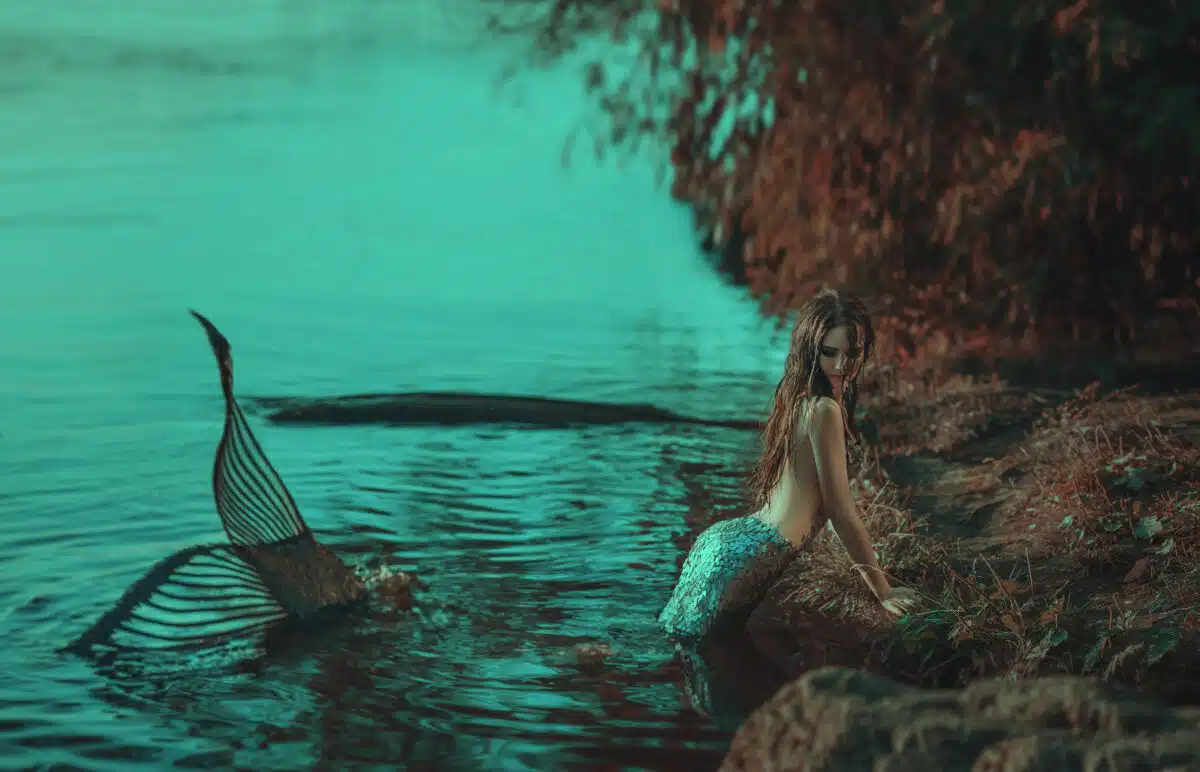
“Song of the Sirens” by Arthur Symons
Our breasts are cold, salt are our kisses,
Your blood shall whiten in our sea-blisses;
A man’s desire is a flame of fire,
But chill as water is our desire.
Chill as water that sucks in
A drowning man’s despairing chin
With a little kissing noise;
And like the water’s voice our voice.
Our hands are colder than your lovers’.
Colder than pearls that the sea covers;
Are a girl’s hands as white as pearls?
Take the hands of the sea-girls,
And come with us to the under-sands;
We will hold in our cold hands
Flaming heart and burning head,
And put thought and love to bed.
We are the last desires; we have waited,
Till, by all things mortal sated,
And by dreams deceived, the scorn
Of every foolish virgin morn,
You, awakening at last,
Drunken, beggared of the past,
In the last lust of despair
Tangle your souls into our hair.
Famous Poems About Sirens

“The Song Of The Siren.” by Marietta Holley
Oh, I am the siren, the siren of the sea,
The sea, the wondrous sea, that lies forevermore before;
I stand a fairy shape upon the shadow of a cliff
Where the water’s drowsy ripple laps the phantom of a shore,
And, oh, so fair, so fair am I, I draw all hearts to me,
For I am the siren, the siren of the sea.
All the glory of my golden tresses gleams upon the air,
How it falls about my snowy shoulders, round and bare and white;
My lips are full of love as rounded grapes are full of wine,
And my eyes are large and languid, and full of dewy light;
Oh, I lure the idle landsmen many a league for love of me,
For I am the siren, the siren of the sea.
Sometimes they press so near that my breath is on their cheek,
And their eager hands can almost touch the glowing bowl I bear,
They can see the beaded froth, the ruby glitter of the wine,
Then I slip from their embraces like a breath of summer air;
Oh, I lightly, lightly glide away, they come no nigher me,
For I am the siren, the siren of the sea.
Sometimes I float along a-standing in a boat,
Before the ships becalmed, where dusky sailors stand,
And the helmsman drops his oar, and the lookout leaves his glass,
So I beckon them, and lure them, with the whiteness of my hand;
Oh, this the song I sing, well they listen unto me?
For I am the siren, the siren of the sea.
Would you from toil and labor flee,
Oh float ye out on this wonderful sea,
From islands of spice the zephyrs blow,
Swaying the galleys to and fro;
Silken sails and a balmy breeze
Shall waft you unto a perfect ease.
Fold your hands and rest, and rest,
The sun sails on from the east to the west,
The days will come, and the days will go,
What good can man for his labor show
In passionless peace, come float with me
Over the waves of this wonderful sea.
Would you forget, oh sorrowful soul,
Come and drink of this golden bowl,
With jewelled poppies about the rim,
Drink of the wine that flushes its brim,
And drown all your haunting memories there,
Your woe and your weary care.
Oh, I am the siren, the siren of the sea,
The sea, the wondrous sea, that lies forevermore before;
Oh, the mystic music ripples, how they break in rosy spray,
But the crystal wave will mock them, they will reach it nevermore,
For it glides away, I glide away, they come no nigher me,
For I am the siren, the siren of the sea.
“At A Solemn Musick” by John Milton
Blest pair of Sirens, pledges of Heav’ns joy,
Sphear-born harmonious Sisters, Voice, and Vers,
Wed your divine sounds, and mixt power employ
Dead things with inbreath’d sense able to pierce,
And to our high-rais’d phantasie present,
That undisturbed Song of pure content,
Ay sung before the saphire-colour’d throne
To him that sits theron
With Saintly shout, and solemn Jubily,
Where the bright Seraphim in burning row
Their loud up-lifted Angel trumpets blow,
And the Cherubick host in thousand quires
Touch their immortal Harps of golden wires,
With those just Spirits that wear victorious Palms,
Hymns devout and holy Psalms
Singing everlastingly;
That we on Earth with undiscording voice
May rightly answer that melodious noise;
As once we did, till disproportion’d sin
Jarr’d against natures chime, and with harsh din
The fair musick that all creatures made
To their great Lord, whose love their motion sway’d
In perfect Diapason, whilst they stood
In first obedience, and their state of good.
O may we soon again renew that Song,
And keep in tune with Heav’n, till God ere long
To his celestial consort us unite,
To live with him, and sing in endles morn of light.
“Veteran Sirens” by Edwin Arlington Robinson
The ghost of Ninon would be sorry now
To laugh at them, were she to see them here,
So brave and so alert for learning how
To fence with reason for another year.
Age offers a far comelier diadem
Than theirs; but anguish has no eye for grace,
When time’s malicious mercy cautions them
To think a while of number and of space.
The burning hope, the worn expectancy,
The martyred humor, and the maimed allure,
Cry out for time to end his levity,
And age to soften its investiture;
But they, though others fade and are still fair,
Defy their fairness and are unsubdued;
Although they suffer, they may not forswear
The patient ardor of the unpursued.
Poor flesh, to fight the calendar so long;
Poor vanity, so quaint and yet so brave;
Poor folly, so deceived and yet so strong,
So far from Ninon and so near the grave.

“The Song the Sirens Sung (from Odyssey XII)” by George Chapman
‘Come here, thou worthy of a world of praise,
That dost so high the Grecian glory raise;
Ulysses! stay thy ship, and that song hear
That none pass’d ever but it bent his ear,
But left him ravish’d, and instructed more
By us, than any ever heard before.
For we know all things whatsoever were
In wide Troy labour’d; whatsoever there
The Grecians and the Trojans both sustain’d
By those high issues that the Gods ordain’d.
And whatsoever all the earth can show
T’ inform a knowledge of desert, we know.’
From “The Odyssey, Book XII” (W. C. Bryant, Translator) by Homer
She spake; the Morning on her golden throne
Looked forth; the glorious goddess went her way
Into the isle, I to my ship, and bade
The men embark and cast the hawsers loose.
And straight they went on board, and duly manned
The benches, smiting as they sat with oars
The hoary waters. Circè, amber-haired,
The mighty goddess of the musical voice,
Sent a fair wind behind our dark-prowed ship
That gayly bore us company, and filled
The sails. When we had fairly ordered all
On board our galley, we sat down, and left
The favoring wind and helm to bear us on,
And thus in sadness I bespake the crew:—
“My friends! it were not well that one or two
Alone should know the oracles I heard
From Circè, great among the goddesses;
And now will I disclose them, that ye all,
Whether we are to die or to escape
The doom of death, may be forewarned. And first
Against the wicked Sirens and their song
And flowery bank she warns us. I alone
May hear their voice, but ye must bind me first
With bands too strong to break, that I may stand
Upright against the mast; and let the cords
Be fastened round it. If I then entreat
And bid you loose me, make the bands more strong.”
Thus to my crew I spake, and told them all
That they should know, while our good ship drew near
The island of the Sirens, prosperous gales
Wafting it gently onward. Then the breeze
Sank to a breathless calm; some deity
Had hushed the winds to slumber. Straightway rose
The men and furled the sails and laid them down
Within the ship, and sat and made the sea
White with the beating of their polished blades,
Made of the fir-tree. Then I took a mass
Of wax and cut it into many parts,
And kneaded each with a strong hand. It grew
Warm with the pressure, and the beams of him
Who journeys round the earth, the monarch Sun.
With this I filled the ears of all my men
From first to last. They bound me, in their turn,
Upright against the mast-tree, hand and foot,
And tied the cords around it. Then again
They sat and threshed with oars the hoary deep.
And when, in running rapidly, we came
So near the Sirens as to hear a voice
From where they sat, our galley flew not by
Unseen by them, and sweetly thus they sang:—
“O world-renowned Ulysses! thou who art
The glory of the Achaians, turn thy bark
Landward, that thou mayst listen to our lay.
No man has passed us in his galley yet,
Ere he has heard our warbled melodies.
He goes delighted hence a wiser man;
For all that in the spacious realm of Troy
The Greeks and Trojans by the will of Heaven
Endured we know, and all that comes to pass
In all the nations of the fruitful earth.”
’T was thus they sang, and sweet the strain. I longed
To listen, and with nods I gave the sign
To set me free; they only plied their oars
The faster. Then upsprang Eurylochus
And Perimedes, and with added chords
Bound me, and drew the others still more tight.
And when we now had passed the spot, and heard
No more the melody the Sirens sang,
My comrades hastened from their ears to take
The wax, and loosed the cords and set me free.
“The Siren’s Cave at Tivoli” by Frances Anne Kemble
As o’er the chasm I breathless hung,
Thus from the depths the Siren sung:
“Down, down into the womb,
Of earth, the daylight’s tomb,
Where the sun’s eyes
Never may shine,
Nor fair moon rise
With smile divine;
Where caverns yawn
Black as despair,
Fatally drawn
I plunge down there;
And with the bound
The rocks resound,
And round and round
My waves are wound
Into the gaping rifts of the mid earth:
O for the sunny springs where I took birth!
The gentle rills,
The tiny brimming fountain,
That, scooped in the warm bosom of the mountain,
Each May shower overfills!
Whence I and my fair sister came; and she
Rolls her smooth silver flood along the way,
That princes made for her, so royally,
Piercing the rock to give her ample sway.
Down the bright sunny steep
Her waters leap,
Myrtle and bay and laurel and wild vine,
A garland for her flowing tresses twine!
The green moss stars the rocks whereon she leaps,
Over her breast the fragrant locust weeps;
The air resounds with her wild shouts of laughter,
The echoes of the hills in chorus after
Repeat the sound, and in her silvery spray
Rainbows are woven by the light of day!
Down in the valley she springs
And sings,
And the sky bends over
Her, like a lover;
And glittering and sparkling her waters run,
A bright sea of snow in the summer sun!
Darkness broods over me the while;
Grim rocks that sweat
With my cold clammy spray,
As down the hopeless way
In one wild jet
My tortured billows lash and leap and boil;
So deep my bed of darkness lies,
That scarce the voice of my great agony
Reaches the skies,
And all ye see
With fearful eyes
Who question me,
Is the gray whirling mist that covers all
As with a pall.
Light! light upon the rocks! sudden and fierce
The sharp flames pierce;
Glaring upon my water
Like the blood-hue of slaughter
A red torch flashes;
As down my wild flood dashes
Wide flaring brightness streams upon my foam,
And flaming fire-wreaths come
Hissing into my waves to find their doom
In the same blackness that devours me.
The huge rocks grin, as with a sudden glee,
At this strange visitation of the light,
And they are made not beautiful, but bright,
As all their horrid piles and masses show,
Hanging above, and heaped below,
Searched by the ruddy glow.
O, let me still in darkness dwell!
Not in this hell
Of lurid light,
That scares the night,
Hence with the leaping glare,
Whose fiery stare
Reveals the secrets of my dismal bed;
Hence with the voices that profane the dread
Of my dark chambers!”—thus the Siren cried,
As o’er the rocky chasm’s black, hideous side
I hung entranced with terror and dismay;
And at that piteous cry I fled away.

“Ulysses and the Siren” by Samuel Daniel
Siren. Come, worthy Greek! Ulysses, come,
Possess these shores with me:
The winds and seas are troublesome,
And here we may be free.
Here may we sit and view their toil
That travail in the deep,
And joy the day in mirth the while,
And spend the night in sleep.
Ulysses. Fair Nymph, if fame or honour were
To be attain’d with ease,
Then would I come and rest with thee,
And leave such toils as these.
But here it dwells, and here must I
With danger seek it forth:
To spend the time luxuriously
Becomes not men of worth.
Siren. Ulysses, O be not deceived
With that unreal name;
This honour is a thing conceived,
And rests on others’ fame:
Begotten only to molest
Our peace, and to beguile
The best thing of our life—our rest,
And give us up to toil.
Ulysses. Delicious Nymph, suppose there were
No honour nor report,
Yet manliness would scorn to wear
The time in idle sport:
For toil doth give a better touch
To make us feel our joy,
And ease finds tediousness as much
As labour yields annoy.
Siren. Then pleasure likewise seems the shore
Whereto tends all your toil,
Which you forego to make it more,
And perish oft the while.
Who may disport them diversely
Find never tedious day,
And ease may have variety
As well as action may.
Ulysses. But natures of the noblest frame
These toils and dangers please;
And they take comfort in the same
As much as you in ease;
And with the thought of actions past
Are recreated still:
When Pleasure leaves a touch at last
To show that it was ill.
Siren. That doth Opinion only cause
That’s out of Custom bred,
Which makes us many other laws
Than ever Nature did.
No widows wail for our delights,
Our sports are without blood;
The world we see by warlike wights
Receives more hurt than good.
Ulysses. But yet the state of things require
These motions of unrest;
And these great Spirits of high desire
Seem born to turn them best:
To purge the mischiefs that increase
And all good order mar:
For oft we see a wicked peace
To be well changed for war.
Siren. Well, well, Ulysses, then I see
I shall not have thee here:
And therefore I will come to thee,
And take my fortune there.
I must be won, that cannot win,
Yet lost were I not won;
For beauty hath created been
T’ undo, or be undone.
“Sea Dreams” by Madison Julius Cawein
I.
Oh, to see in the night in a May moon’s light
A nymph from siren caves,
With a crown of pearl, sea-gems in each curl
Dance down white, star-stained waves!
Oh, to list in the gloam by the pearly foam
Of a sad, far-sounding shore
The strain of the shell of an ocean belle
From caves where the waters roar!
With a hollow shell drift up in the moon
To sigh in my ears this ocean tune: –
II.
“Wilt follow, wilt follow to caverns hollow,
That echo the tumbling spry?
Wilt follow thy queen to islands green,
Vague islands of witchery?
O follow, follow to grottoes hollow,
And isles in a purple sea,
Where rich roses twine and the lush woodbine
Weaves a musky canopy!”
III.
Oh, to float in the gloam on the bubbly foam
With her lily face above!
Oh, to lie in a barque and a wild song hark,
And a billow-nymph to love!
I’d lie at her feet and my heart should beat
To the music of her sighs;
But the stars in her face my passion should trace,
Unseen all the stars of the skies.
IV.
Away, away with the witch of spray
To her Aidenn islands far;
And the blue above, drunk-mad with love,
Dance down each singing star.
Leave, leave to the heaven its morning star
In a cloud of bolted snow,
To laugh at the world and herald far
Our wedlock and joy below.
“The Sirens” by James Russell Lowell
The sea is lonely, the sea is dreary,
The sea is restless and uneasy;
Thou seekest quiet, thou art weary,
Wandering thou knowest not whither;—
Our little isle is green and breezy,
Come and rest thee! Oh come hither,
Come to this peaceful home of ours,
Where evermore
The low west-wind creeps panting up the shore
To be at rest among the flowers;
Full of rest, the green moss lifts,
As the dark waves of the sea
Draw in and out of rocky rifts,
Calling solemnly to thee
With voices deep and hollow,—
“To the shore
Follow! Oh, follow!
To be at rest forevermore!
Forevermore!”
Look how the gray old Ocean
From the depth of his heart rejoices,
Heaving with a gentle motion,
When he hears our restful voices;
List how he sings in an undertone,
Chiming with our melody;
And all sweet sounds of earth and air
Melt into one low voice alone,
That murmurs over the weary sea,
And seems to sing from everywhere,—
“Here mayst thou harbor peacefully,
Here mayst thou rest from the aching oar;
Turn thy curvëd prow ashore,
And in our green isle rest forevermore!
Forevermore!”
And Echo half wakes in the wooded hill,
And, to her heart so calm and deep,
Murmurs over in her sleep,
Doubtfully pausing and murmuring still,
“Evermore!”
Thus, on Life’s weary sea,
Heareth the marinere
Voices sweet, from far and near,
Ever singing low and clear,
Ever singing longingly.
It is not better here to be,
Than to be toiling late and soon?
In the dreary night to see
Nothing but the blood-red moon
Go up and down into the sea;
Or, in the loneliness of day,
To see the still seals only
Solemnly lift their faces gray,
Making it yet more lonely?
Is it not better than to hear
Only the sliding of the wave
Beneath the plank, and feel so near
A cold and lonely grave,
A restless grave, where thou shalt lie
Even in death unquietly?
Look down beneath thy wave-worn bark,
Lean over the side and see
The leaden eye of the sidelong shark
Upturnëd patiently,
Ever waiting there for thee:
Look down and see those shapeless forms,
Which ever keep their dreamless sleep
Far down within the gloomy deep,
And only stir themselves in storms,
Rising like islands from beneath,
And snorting through the angry spray,
As the frail vessel perisheth
In the whirls of their unwieldy play;
Look down! Look down!
Upon the seaweed, slimy and dark,
That waves its arms so lank and brown,
Beckoning for thee!
Look down beneath thy wave-worn bark
Into the cold depth of the sea!
Look down! Look down!
Thus, on Life’s lonely sea,
Heareth the marinere
Voices sad, from far and near,
Ever singing full of fear,
Ever singing dreadfully.
Here all is pleasant as a dream;
The wind scarce shaketh down the dew,
The green grass floweth like a stream
Into the ocean’s blue;
Listen! Oh, listen!
Here is a gush of many streams,
A song of many birds,
And every wish and longing seems
Lulled to a numbered flow of words,—
Listen! Oh, listen!
Here ever hum the golden bees
Underneath full-blossomed trees,
At once with glowing fruit and flowers crowned;—
So smooth the sand, the yellow sand,
That thy keel will not grate as it touches the land;
All around with a slumberous sound,
The singing waves slide up the strand,
And there, where the smooth, wet pebbles be
The waters gurgle longingly,
As if they fain would seek the shore,
To be at rest from the ceaseless roar,
To be at rest forevermore,—
Forevermore.
Thus, on Life’s gloomy sea,
Heareth the marinere
Voices sweet, from far and near,
Ever singing in his ear,
“Here is rest and peace for thee!”

“The Siren” by Oliver Herford
The Siren may be said to be
The Chorus-Lady of the Sea;
Tho’ Mermaids claim her as their kin,
Instead of fishy tail and fin
Two shapely feet rejoice the view
(With all that appertains thereto).
When to these other charms we add
A voice that drives the hearer mad,
Who will dispute her claim to be
The Chorus-Lady of the Sea?
“The Siren’s Song” by Grace Constant Lounsbery
Оh, tarry ye a while,
For welcome, in this isle
That harbours its delights for thine and thee,
While listening ye rejoice
To hear the Siren’s voice,
The Siren’s song of love and mystery.
We twain are wondrous fair,
And deep within our hair
The nestling shadows flee from garish day;
The sunset in our eyes
Lingers, when from the skies
The splendour of the sunlight fades away.
The pale narcissi stand
Like nymphs on either hand,
And marvel at their whiteness in the brook;
For all their rivalry
No flower that flecks the lea,
Can vie with us in field or dell or nook.
No winter here devours
The summer’s fruits or flowers;
The fettered winds go whispering to and fro;
No heedless foot forgets
And slays the violets,
That hide them where the reeds and grasses
blow.
Here Love’s sweet self unarmed
Feels all his fierce ways charmed;
His influence falls, like showers of vernal rain,
On tired flowers freshening,
Or birds awakening,
While pleasure knows no aftermath of pain.
Come, idle where the stream,
With many a glint and gleam,
Floats all its silver ripples to the sea;
Or, where the dappled shade
Half hides the darkening glade,
Pursue the dancing shadows stealthily.
Like some shy-footed fawn,
Surprise the startled morn;
And dive within the river where it slips,
And deepens, and grows still,
Forgetting how each rill
Upon the mountain sang with boistrous lips.
Lo! far within the wood,
Where dwells the Satyr brood,
Are springs of milk and honey, while, men say
Half hidden, through the green,
Half guessed at, and half seen,
The mænad and the bassarid do play-
Garlands they gather there
To weave about thine hair,
And, lo, thy couch they smother o’er with flowers.
They laugh and live as one
Who hides him from the sun,
Through all the verdant length of vernal hours.
The Siren’s Song
by Grace Constant Lounsbery
Оh, tarry ye a while,
For welcome, in this isle
That harbours its delights for thine and thee,
While listening ye rejoice
To hear the Siren’s voice,
The Siren’s song of love and mystery.
We twain are wondrous fair,
And deep within our hair
The nestling shadows flee from garish day;
The sunset in our eyes
Lingers, when from the skies
The splendour of the sunlight fades away.
The pale narcissi stand
Like nymphs on either hand,
And marvel at their whiteness in the brook;
For all their rivalry
No flower that flecks the lea,
Can vie with us in field or dell or nook.
No winter here devours
The summer’s fruits or flowers;
The fettered winds go whispering to and fro;
No heedless foot forgets
And slays the violets,
That hide them where the reeds and grasses
blow.
Here Love’s sweet self unarmed
Feels all his fierce ways charmed;
His influence falls, like showers of vernal rain,
On tired flowers freshening,
Or birds awakening,
While pleasure knows no aftermath of pain.
Come, idle where the stream,
With many a glint and gleam,
Floats all its silver ripples to the sea;
Or, where the dappled shade
Half hides the darkening glade,
Pursue the dancing shadows stealthily.
Like some shy-footed fawn,
Surprise the startled morn;
And dive within the river where it slips,
And deepens, and grows still,
Forgetting how each rill
Upon the mountain sang with boistrous lips.
Lo! far within the wood,
Where dwells the Satyr brood,
Are springs of milk and honey, while, men say
Half hidden, through the green,
Half guessed at, and half seen,
The mænad and the bassarid do play-
Garlands they gather there
To weave about thine hair,
And, lo, thy couch they smother o’er with flowers.
They laugh and live as one
Who hides him from the sun,
Through all the verdant length of vernal hours.
And when the nightingale,
Within the distant dale,
Maddens the midnight with her song of songs,
That wanderer, the moon,
With listening feigns a swoon,
And far unto the dawn her stay prolongs.
What profits it to plough
The barren sea? Each bough
Hangs heavy with its fruit, its shade, for thee;
While we the Sirens haunt
Thy heart with fairest chaunt
And life is one mellifluous harmony.
Since each deciduous rose,
And soft ephemeral snows,
And loves more fragile and more fair than these,
With stern fatality
Mock man’s mortality,
Give o’er thy soul to songs that soothe and ease.
Then tarry ye a while,
Fair wanderer, in this isle
That harbours its delights for thine and thee.
Yea, tarry, and rejoice
To hear the Siren’s voice,
Oh, stay thy ship, fair wanderers; tarry ye.
“Song of the Sirens” by Caroline Giffard Phillipson
Come ! Come ! Come ! Mariners
faint and weary ,
Reft ! Reſt ! Reſt ! fair is our
iſland home.
Stay ! Stay ! Stay ! Are not the black ſhips
dreary ?
Fly ! Fly ! Fly ! over the pearly foam .
Lift ! Lift ! Lift ! Hear ye the harp -tones
thrilling ?
Near ! Near ! Near ! ſweet are the melodies
ſwelling,
Far ! Far ! Far ! echoes around are dying,
Lift ! Lift ! Liſt ! Lift to the Sirens ‘ Song.
Come ! Come ! Come ! dark grow the purple
waters,
Reſt ! Reft ! Reſt ! white hands the garlands
twine,
Stay ! Stay ! Stay ! lovely are ocean’s daughters,
Fly ! Fly ! Fly ! clear is the rofy wine.
Liſt ! Liſt ! Liſt ! hear ye our charmèd numbers,
Near ! Near ! Near ! hovers night’s drowſy
pinions,
Far ! Far ! Far ! lies the old land ye’re ſeeking,
Liſt ! Liſt ! Liſt ! Liſt to the Sirens’ Song.
Come ! Come ! Come ! Chief with the long
locks hoary,
Reſt ! Reſt ! Reſt ! knowledge ofall is ours !
Stay ! Stay ! Stay ! Warriorsrenown’d in ſtory,
Fly ! Fly ! Fly ! feaſt in our fragrant bowers.
Liſt ! Liſt ! Lift ! waves o’er the pale ſands are
creeping,
Near ! Near ! Near ! ſee ye our torches gleaming,
Far ! Far ! Far ! morning’s bright chariot lingers,
Liſt ! Liſt ! Liſt ! Lift to the Sirens’ Song.

“A Knight of the Ocean-Sea (excerpt)” by Alfred Noyes
There was one
Myself had idly scratched away one dawn,
One mad May-dawn, three hundred years ago,
When out of the woods we came with hawthorn boughs
And found the doors locked, as they seemed to-night.
Three hundred years ago-nay, Time was dead!
No need to scan the sign-board any more
Where that white-breasted siren of the sea
Curled her moon-silvered tail among such rocks
As never in the merriest seaman’s tale
Broke the blue-bliss of fabulous lagoons
Beyond the Spanish Main.
And, through the dream,
Even as I stood and listened, came a sound
Of clashing wine-cups : then a deep-voiced song
Made the old timbers of the Mermaid Inn
Shake as a galleon shakes in a gale of wind
When she rolls glorying through the Ocean-sea.
“Antipholus” by William Shakespeare
O, train me not, sweet mermaid, with thy note,
To drown me in thy sister’s flood of tears.
Sing, siren, for thyself, and I will dote;
Spread o’er the silver waves thy golden hairs,
And as a bed I’ll take them and there lie,
And in that glorious supposition think
He gains by death that hath such means to die;
Let Love, being light, be drowned if she sink!
“Address to the Mermaid” by Ebenezer Bailey
Art thou indeed, what thou would’st seem to be,
Imprison’d in that curious box of thine,
A veritable daughter of the sea,
Like Aphrodité born in foam and brine?
Though, I must say, were such the queen of Love,
I marvel greatly at the taste of Jove.
But thou, perhaps, some ages since, wast fair,
The envy of all mermaids far around;
Then that bald pate of thine with azure hair,
That undulated with the waves, was crown’d;
Thou art, howe’er, a mermaid’s mummy now,
And with a wig should’st hide that wrinkled brow.
Hast thou e’er sported in the coral bowers,
That deep beneath the Indian waters grow,
Where gems bud forth, and wave the sea-green flowers,
With graceful motion, as the currents flow?
For there the tempests have no power, that sweep
With madness o’er the surface of the deep.
Perchance ’t was thy delight, in former times,
To rest by moon-light on the ocean-rocks,
And to the hum of waters chant thy rhymes,
Or with those fingers curl thy humid locks;
Then wo to any luckless bark for aye,
Whose pilot listen’d to thy treacherous lay.
Is it not glorious to behold the gems,
That shine like stars in ocean’s crystal caves?—
The groves, where emeralds bud on amber stems,
Moving harmonious with the rocking waves?—
And all the gorgeous mysteries, that sleep
Beneath the endless waters of the deep?
There, we may guess, the Nereids delight
To build their garnish’d grottoes, fair to see,
With domes of living diamonds, that as bright
Shine out, as suns in the immensity
Of heaven, while all their ruby pavements blush,
As through their clefts the shouting waters rush
There shells of pleasant forms and nameless hues
To alabaster columns cling; and there
Such flowers spring up, as never drank the dews,
Nor breathed the freshness of the upper air;
But fairer, lovelier far, their tints that glow
On the pure sand, like rainbow hues on snow.
And mighty Argosies, that moved in pride,
Like living things, along the troubled deep,
Lie many a fathom now beneath the tide;
And gallant chiefs, and fearless sailors sleep,
In kingly state, on beds of pearl and gold,
Who for a biscuit had their birthrights sold.
Oh! could’st thou tell,—if thou indeed hast seen,
“For in those eyes there is no speculation,”—
The wonders hid beneath the ocean green,
T’ would mad the knowing ones with admiration,
And many a learned bachelor would swear
That thou, in spite of all thy teeth, art fair!
But why should I ask questions of a thing,
That hears not, sees not, knows not,—only grins?
And grin you may, so long as quarters ring,
For, says the adage, “let him laugh that wins!
Being a siren, well may you entice
The unwary once,—you cannot cheat me twice.
Would I possess’d a charm to ope the cell
Of glass, when thou art fasten’d like a reel
Within a bottle: I could never tell
How this got in; but could my fingers feel
That scaly skin of thine, there ’s “a shrewd doubt”
’T would be no puzzle why you ’ll not come out.
But go in peace, thou thing of “shreds and patches”—
Go not, howe’er, where Doctor Mitchill is;
For he will mangle thee, if he but catches
A glimpse of thy uncouth and monkey phiz,
And then will swear, in spite of thy long tail,
Thou art no more a fish than was his whale!
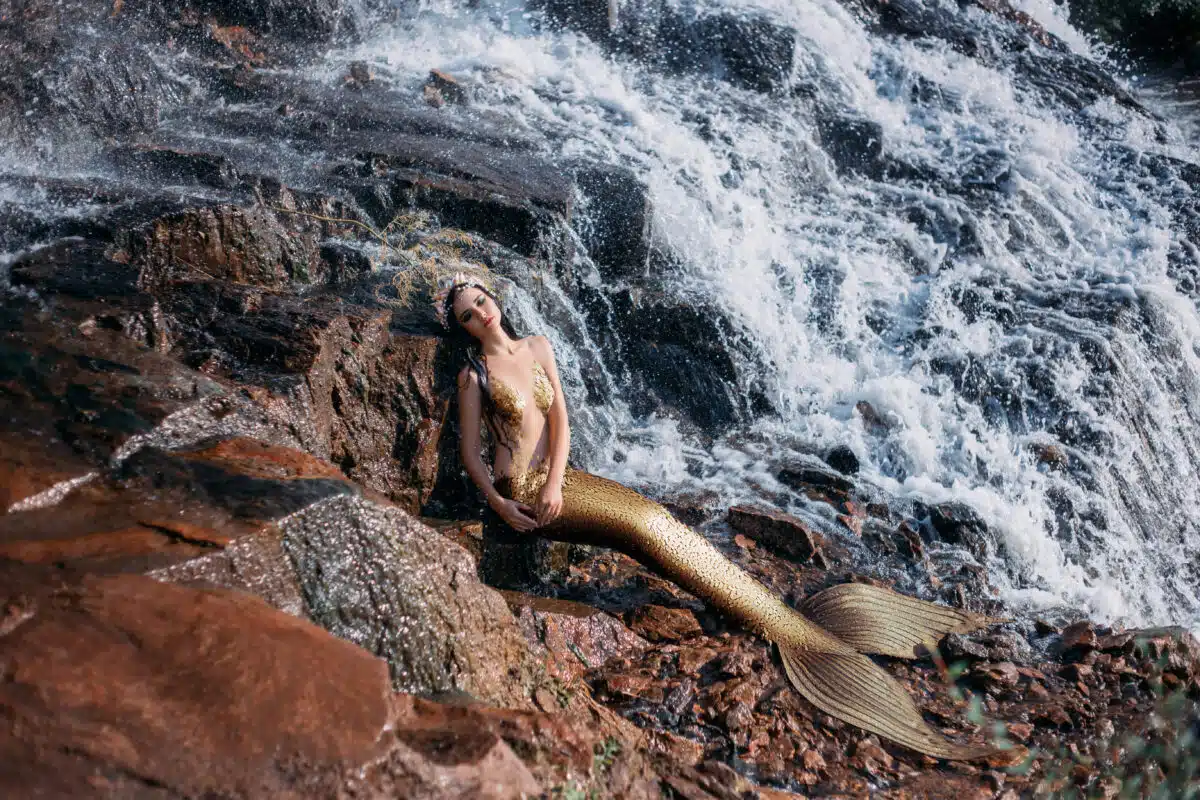
“Song: Sabrina Fair” by John Milton
III
Sabrina fair
Listen where thou art sitting
Under the glassie, cool, translucent wave,
In twisted braids of Lillies knitting
The loose train of thy amber-droping hair,
Listen for dear honour’s sake,
Goddess of the silver lake,
Listen and save.
Listen and appear to us
In name of great Oceanus,
By the earth-shaking Neptune’s mace,
And Tethys grave majestick pace,
By hoary Nereus wrincled look,
And the Carpathian wisards hook,
By scaly Tritons winding shell,
And old sooth-saying Glaucus spell,
By Leucothea’s lovely hands,
And her son that rules the strands,
By Thetis tinsel-slipper’d feet,
And the Songs of Sirens sweet,
By dead Parthenope’s dear tomb,
And fair Ligea’s golden comb,
Wherwith she sits on diamond rocks
Sleeking her soft alluring locks,
By all the Nymphs that nightly dance
Upon thy streams with wily glance,
Rise, rise, and heave thy rosie head
From thy coral-pav’n bed,
And bridle in thy headlong wave,
Till thou our summons answered have.
Listen and save.
Sabrina rises, attended by water-Nymphes,
and sings
By the rushy-fringed bank,
Where grows the Willow and the Osier dank,
My sliding Chariot stayes,
Thick set with Agat, and the azurn sheen
Of Turkis blew, and Emrauld green
That in the channell strayes,
Whilst from off the waters fleet
Thus I set my printless feet
O’re the Cowslips Velvet head,
That bends not as I tread,
Gentle swain at thy request
I am here.
“In a Bye-Canal” by Herman Melville
A swoon of noon, a trance of tide,
The hushed siesta brooding wide
Like calms far off Peru;
No floating wayfarer in sight,
Dumb noon, and haunted like the night
When Jael the wiled one slew.
A languid impulse from the oar
Plied by my indolent gondolier
Tinkles against a palace hoar,
And, hark, response I hear!
A lattice clicks; and lo, I see
Between the slats, mute summoning me,
What loveliest eyes of scintillation,
What basilisk glance of conjuration!
Fronted I have, part taken the span
Of portents in nature and peril in man.
I have swum—I have been
’Twixt the whale’s black flukes and the white shark’s fin;
The enemy’s desert have wandered in,
And there have turned, have turned and scanned,
Following me how noiselessly,
Envy and Slander, lepers hand in hand.
All this. But at the latticed eye—
“Hey! Gondolier, you sleep, my man;
Wake up!” And, shooting by, we ran;
The while I mused, This, surely now,
Confutes the Naturalists, allow!
Sirens, true sirens verily be,
Sirens, waylayers in the sea.
Well, wooed by these same deadly misses,
Is it shame to run?
No! flee them did divine Ulysses,
Brave, wise, and Venus’ son.
“The Fisherman” by Luis G. Dato
A fisherman wades, knee-deep in the water,
Feeling the stones at the bottom with his feet and his fork,
Lighting his way with an oil-fed torch of bamboo.
And the curtain of darkness behind him,
And the halo of light before him,
Wrap the homely-looking man and his four-pointed fork
In chimeras of unreality.
Ringing faintly comes the song of a siren
From under the rocks where he walks.
And the fisherman seems like the siren endowed
With the mirthless melody of waves,
Though a sound he makes not, nor speaks in the silence.
A merman he seems, bewailing his lost and his children
At midnight (and midnight it was when he went to the shore).
And the fork in his hand
Looks like the scepter of the king of the sea. . . .
A king, bereft of his children,
A ruler deserted by the queen of the sea.

“The Song of Siva” by Ameen Rihani
’Tis Night; all the Sirens are silent,
All the Vultures asleep;
And the horns of the Tempest are stirring
Under the Deep;
’Tis Night; all the snow-burdened
Mountains Dream of the Sea,
And down in the Wadi the River
Is calling to me.
’Tis Night; all the Caves of the Spirit
Shake with desire,
And the Orient Heaven’s essaying
Its lances of fire;
They hear, in the stillness that covers
The land and the sea,
The River, in the heart of the Wadi,
Calling to me.
’Tis night, but a night of great joyance,
A night of unrest;—
The night of the birth of the spirit
Of the East and the West;
And the Caves and the Mountains are dancing
On the Foam of the Sea,
For the River inundant is calling,
Calling to me.
“The Chambered Nautilus.” by Mary E. Burt
This is the ship of pearl, which, poets feign,
Sailed the unshadowed main,—
The venturous bark that flings
On the sweet summer wind its purpled wings
In gulfs enchanted, where the Siren sings,
And coral reefs lie bare,
Where the cold sea-maids rise to sun their streaming hair.
Its webs of living gauze no more unfurl;
Wrecked is the ship of pearl!
And every chambered cell,
Where its dim dreaming life was wont to dwell,
As the frail tenant shaped his growing shell,
Before thee lies revealed,—
Its irised ceiling rent, its sunless crypt unsealed!
Year after year beheld the silent toil
That spread his lustrous coil;
Still, as the spiral grew,
He left the past year’s dwelling for the new,
Stole with soft step its shining archway through,
Built up its idle door,
Stretched in his last-found home, and knew the old no more.
Thanks for the heavenly message brought by thee,
Child of the wandering sea,
Cast from her lap, forlorn!
From thy dead lips a clearer note is born
Than ever Triton blew from wreathed horn!
While on mine ear it rings,
Through the deep caves of thought I hear a voice that sings:—
Build thee more stately mansions, O my soul,
As the swift seasons roll!
Leave thy low-vaulted past!
Let each new temple, nobler than the last,
Shut thee from heaven with a dome more vast,
Till thou at length art free,
Leaving thine outgrown shell by life’s unresting sea!
“To Mr S. B.” by John Donne
O thou which to search out the secret parts
Of the India, or rather Paradise
Of knowledge, hast with courage and advise
Lately launch’d into the vast Sea of Arts,
Disdaine not in thy constant travailing
To doe as other Voyagers, and make
Some turnes into lesse Creekes, and wisely take
Fresh water at the Heliconian spring;
I sing not, Siren like, to tempt; for I
Am harsh; nor as those Scismatiques with you,
Which draw all wits of good hope to their crew;
But seeing in you bright sparkes of Poetry,
I, though I brought no fuell, had desire
With these Articulate blasts to blow the fire.
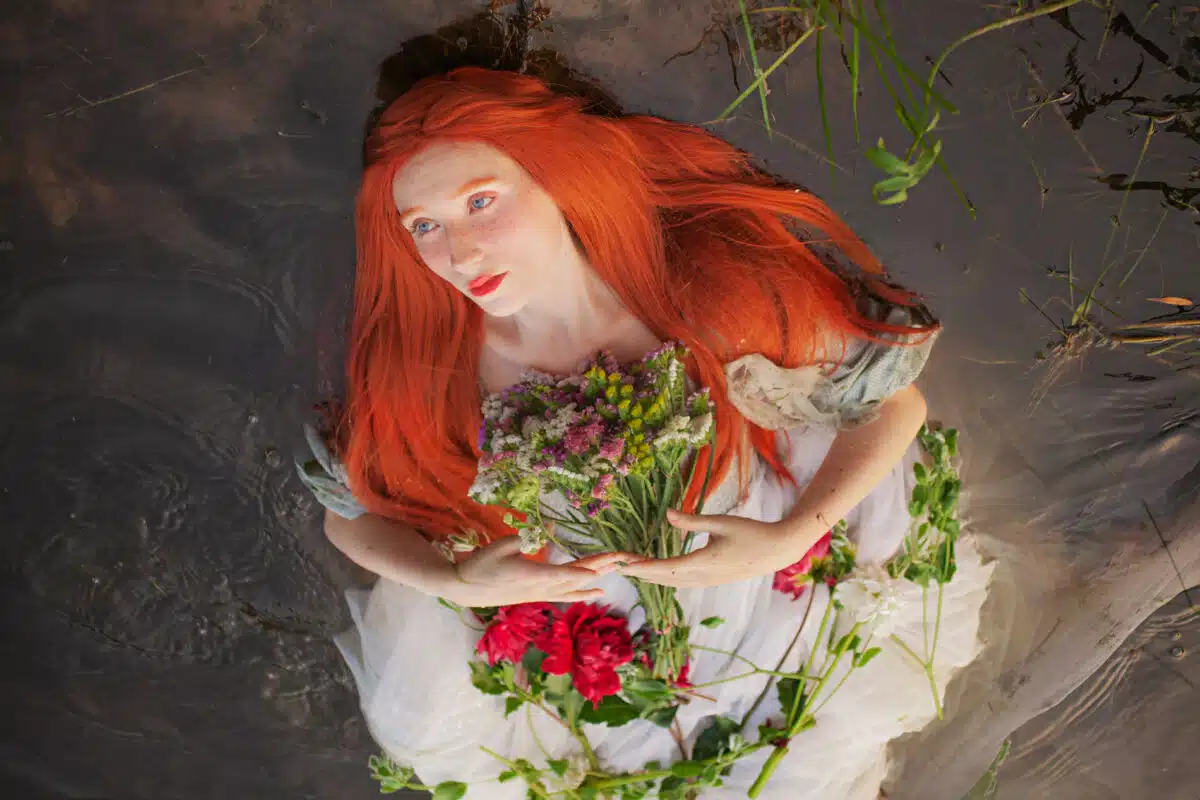
“O Sorrow” by John Keats
From ‘Endymion’
O sorrow,
Why dost borrow
The natural hue of health, from vermeil lips?—
To give maiden blushes
To the white rose bushes?
Or is’t thy dewy hand the daisy tips?
O Sorrow,
Why dost borrow
The lustrous passion from a falcon-eye?—
To give the glow-worm light?
Or, on a moonless night,
To tinge, on syren shores, the salt sea-spry?
O Sorrow,
Why dost borrow
The mellow ditties from a mourning tongue?—
To give at evening pale
Unto the nightingale,
That thou mayst listen the cold dews among?
O Sorrow,
Why dost borrow
Heart’s lightness from the merriment of May?—
A lover would not tread
A cowslip on the head,
Though he should dance from eve till peep of day—
Nor any drooping flower
Held sacred for thy bower,
Wherever he may sport himself and play.
To Sorrow
I bade good morrow,
And thought to leave her far away behind;
But cheerly, cheerly,
She loves me dearly;
She is so constant to me, and so kind:
I would deceive her,
And so leave her,
But ah! she is so constant and so kind….
Come then, Sorrow!
Sweetest Sorrow!
Like an own babe I nurse thee on my breast:
I thought to leave thee
And deceive thee,
But now of all the world I love thee best.
“The Twelfth Book Of Homer’s Odysseys: The Argument” by Homer
He shows from Hell his safe retreat
To th’ isle Ææa, Circe’s seat;
And how he scap’d the Sirens’ calls,
With th’ erring rocks, and waters’ falls,
That Scylla and Charybdis break;
The Sun’s stolen herds; and his sad wreak
Both of Ulysses’ ship and men,
His own head ‘scaping scarce the pain.
“The Twelfth Book Of Homer’s Odysseys: The Argument” by Homer
The rocks that err’d.
The Sirens’ call.
The Sun’s stolen herd.
The soldiers’ fall.
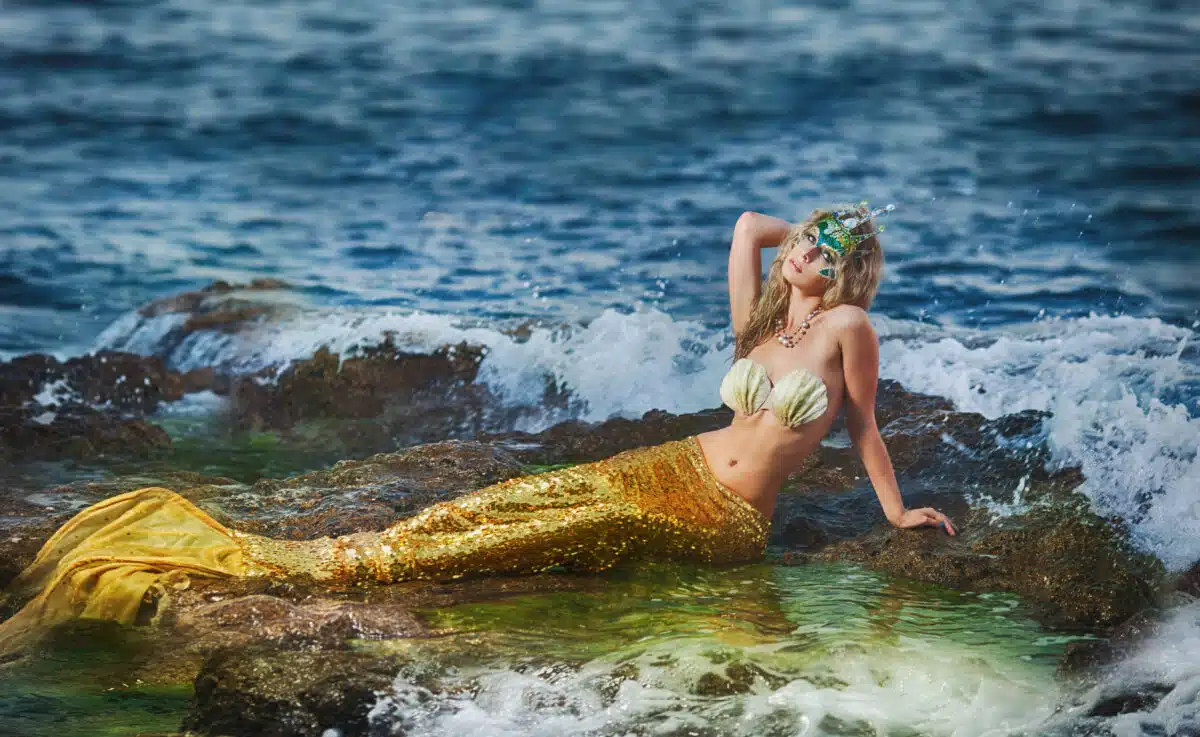
“Eyes of Blue” by Théophile Gautier
A woman, mystic, sweet,
Whose beauty draws my soul,
Stands silent where the fleet
And singing waters roll.
Her eyes, the mirrored note
Of heaven, merge heaven’s blue
Bestarred of lights remote,
With the sea’s glaucous hue.
Within their languor set,
Smiles sadness infinite.
Tears make the sparkles wet,
And tender grows the light.
Like sea-gulls from aloft
That graze the ocean free,
Her lashes flutter soft
Upon an azure sea.
As slumbering treasures drowned
Send shimmers lightly up,
Gleams through the tide profound
The King of Thule’s cup.
Athwart the weedy swirl
Brilliant, the waves upon,
Shine Cleopatra’s pearl,
And ring of Solomon.
The crown to ocean cast,
That Schiller showed to us,
Still under sea caught fast,
Beams clear and luminous.
A magic in that gaze
Draws me, mad venturer!
Thus mermaid’s magic ways
Drew Harold Haarfager.
And all my soul unquelled
Adown the gulf betrayed
Dives, to the quest impelled
Of some elusive shade.
The siren fitfully
Displays her body’s gleam,
Her breast and arms that ply
Through waves of amorous dream.
The water heaves and falls,
Like breasts with passion’s breath.
The breeze insistent calls
To me, and murmureth:
“Come to my pearly bed!
My ocean arms shall slip
About thee: salt shall spread
To honey on thy lip!
Oh, let the billows link
Above us! Thou shalt, warm,
From cup of kisses drink
Oblivion of the storm!”
Thus sighs the glance that sweeps
From out those sea-blue gates,
Till heart down treacherous deeps
The hymen consummates.
“To Robert Browning” by Walter Savage Landor
There is delight in singing, tho’ none hear
Beside the singer: and there is delight
In praising, tho’ the praiser sit alone
And see the prais’d far off him, far above.
Shakespeare is not our poet, but the world’s,
Therefore on him no speech! and brief for thee,
Browning! Since Chaucer was alive and hale,
No man hath walkt along our roads with step
So active, so inquiring eye, or tongue
So varied in discourse. But warmer climes
Give brighter plumage, stronger wing: the breeze
Of Alpine highths thou playest with, borne on
Beyond Sorrento and Amalfi, where
The Siren waits thee, singing song for song.
“Art” by Théophile Gautier
More fair the work, more strong,
Stamped in resistance long,—
Enamel, marble, song.
Poet, no shackles bear,
Yet bid thy Muse to wear
The buskin bound with care.
A fashion loose forsake,—
A shoe of sloven make,
That any foot may take.
Sculptor, the clay withstand,
That yieldeth to the hand,
Though listless heart command.
Contend till thou have wrought,
Till the hard stone have caught
The beauty of thy thought.
With Paros match thy might,
And with Carrara bright,
That guard the line of light.
Borrow from Syracuse
The bronze’s stubborn use,
Wherein thy form to choose.
And with a delicate grace
In the veined onyx trace
Apollo’s perfect face.
Painter, put thou aside
The transient. Be thy pride
The colour furnace-tried.
Limn thou, fantastic, free
Blue sirens of the sea,
And beasts of heraldry.
Before a nimbus gold
Transcendently uphold
The Child, the Cross foretold.
Things perish. Gods have passed.
But song sublimely cast
Shall citadels outlast.
And the forgotten seal
Turned by the plowman’s steel
An emperor may reveal.
For Art alone is great:
The bust survives the state,
The crown the potentate.
Carve, burnish, build thy theme,—
But fix thy wavering dream
In the stern rock supreme.

“The Hope of My Heart” by John McCrae
“Delicta juventutis et ignorantius ejus,
quoesumus ne memineris, Domine.”
I left, to earth, a little maiden fair,
With locks of gold, and eyes that shamed the light;
I prayed that God might have her in His care
And sight.
Earth’s love was false; her voice, a siren’s song;
(Sweet mother-earth was but a lying name)
The path she showed was but the path of wrong
And shame.
“Cast her not out!” I cry. God’s kind words come —
“Her future is with Me, as was her past;
It shall be My good will to bring her home
At last.”
“The Great Figure” by William Carlos Williams
Among the rain
and lights
I saw the figure
in gold
on a red
firetruck
moving
with weight and urgency
tense
unheeded
to gong clangs
siren howls
and wheels rumbling
through the dark city.
Love Poems About Sirens
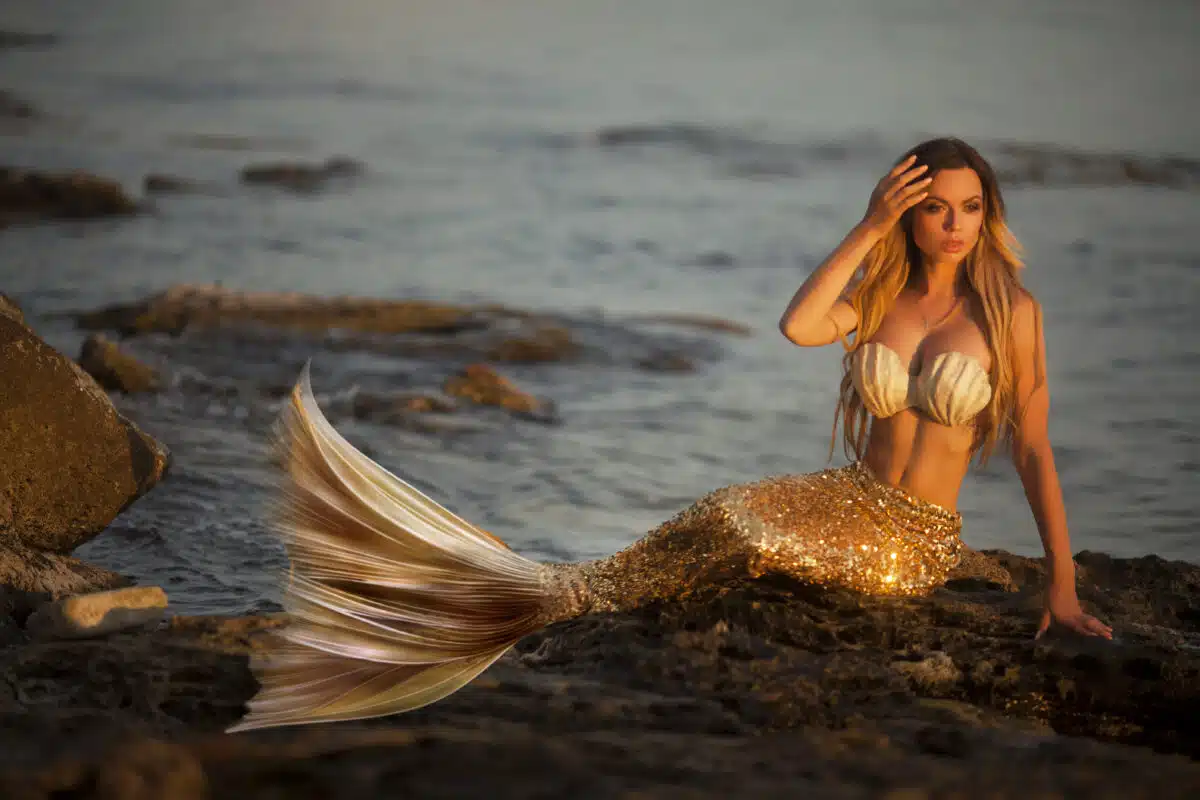
“The Sirens Sing” by Frank T. Marzials
Hist, hist, ye winds, ye whispering wavelets hist,
Their toil is done, their teen and trouble are o’er,
Wash them, ye waves, in silence to the shore,
Waft them, ye winds, with voices hushed and whist.
Hist, waves and winds, here shall their eyes be kist
By love, and sweet love-slumber, till the roar
Of forepast storms, now stilled, for evermore,
Die on their dream-horizons like dim mist.
What of renown, ye winds, when storms are done?
A faded foam-flower on a wearying wave.
All toil is but the digging of a grave.
Here let them rest awhile ere set the sun,
And sip the honey’d moments one by one—
So fleet, so sweet, so few to squander or save.
“The Song of the Siren Parthenope” by Anna Brownell Jameson
Mine are these waves, and mine the twilight depths
O’er which they roll, and all these tufted isles
That lift their backs like dolphins from the deep,
And all these sunny shores that gird us round!
Listen! O, listen to the sea-maid’s shell;
Ye who have wandered hither from far climes,
(Where the coy Summer yields but half her sweets)
To breathe my bland, luxurious airs, and drink
My sunbeams! and to revel in a land
Where Nature, decked out like a bride to meet
Her lover, lays forth all her charms, and smiles
Languidly bright, voluptuously gay,
Sweet to the sense, and tender to the heart.
Listen! O, listen to the sea-maid’s shell;
Ye who have fled your natal shores in hate
Or anger, urged by pale disease, or want,
Or grief, that, clinging like the spectre bat,
Sucks drop by drop the life-blood from the heart,
And hither come to learn forgetfulness
Or to prolong existence! ye shall find
Both,—though the spring Lethean flow no more,
There is a power in these entrancing skies
And murmuring waters and delicious airs,
Felt in the dancing spirits and the blood,
And falling on the lacerated heart
Like balm, until that life becomes a boon,
Which elsewhere is a burthen and a curse.
Hear then, O, hear the sea-maid’s airy shell;
Listen, O listen! ’t is the siren sings,—
The spirit of the deep,—Parthenope,—
She who did once i’ the dreamy days of old
Sport on these golden sands beneath the moon,
Or poured the ravishing music of her song
Over the silent waters, and bequeathed
To all these sunny capes and dazzling shores
Her own immortal beauty and her name.
Near to the silver Trent
Sirena dwelleth;
She to whom Nature lent
All that excelleth;
By which the Muses late
And the neat Graces
Have for their greater state
Taken their places;
Twisting an anadem
Wherewith to crown her,
As it belonged to them
Most to renown her.
On thy bank,
In a rank,
Let thy swans sing her,
And with their music
Along let them bring her.
Tagus and Pactolus
Are to thee debtor,
Nor for their gold to us
Are they the better:
Henceforth of all the rest
Be thou the River
Which, as the daintiest,
Puts them down ever.
For as my precious one
O’er thee doth travel,
She to pearl paragon
Turneth thy gravel.
On thy bank …
Our mournful Philomel,
That rarest tuner,
Henceforth in Aperil
Shall wake the sooner,
And to her shall complain
From the thick cover,
Redoubling every strain
Over and over:
For when my Love too long
Her chamber keepeth,
As though it suffered wrong,
The Morning weepeth.
On thy bank …
Oft have I seen the Sun,
To do her honour,
Fix himself at his noon
To look upon her;
And hath gilt every grove,
Every hill near her,
With his flames from above
Striving to cheer her:
And when she from his sight
Hath herself turnèd,
He, as it had been night,
In clouds hath mournèd.
On thy bank
The verdant meads are seen,
When she doth view them,
In fresh and gallant green
Straight to renew them;
And every little grass
Broad itself spreadeth,
Proud that this bonny lass
Upon it treadeth:
Nor flower, is so sweet
In this large cincture,
But it upon her feet
Leaveth some tincture.
On thy bank …
The fishes in the flood,
When she doth angle,
For the hook strive a-good
Them to entangle;
And leaping on the land,
From the clear water,
Their scales upon the sand
Lavishly scatter;
—Therewith to pave the mould
Whereon she passes,
So herself to behold
As in her glasses.
On thy bank …
When she looks out by night,
The stars stand gazing,
Like comets to our sight
Fearfully blazing;
As wond’ring at her eyes
With their much brightness,
Which so amaze the skies,
Dimming their lightness.
The raging tempests are calm
When she speaketh,
Such most delightsome balm
From her lips breaketh.
On thy bank …
In all our Brittany
There’s not a fairer,
Nor can you fit any
Should you compare her.
Angels her eyelids keep,
All hearts surprising;
Which look whilst she doth sleep
Like the sun’s rising:
She alone of her kind
Knoweth true measure,
And her unmatchèd mind
Is heaven’s treasure.
On thy bank …
Fair Dove and Derwent clear,
Boast ye your beauties,
To Trent your mistress here
Yet pay your duties:
My Love was higher born
Tow’rds the full fountains,
Yet she doth moorland scorn
And the Peak mountains;
Nor would she none should dream
Where she abideth,
Humble as is the stream
Which by her slideth.
On thy bank …
Yet my poor rustic Muse
Nothing can move her,
Nor the means I can use
Though her true lover:
Many a long winter’s night
Have I waked for her,
Yet this my piteous plight
Nothing can stir her.
All thy sands, silver Trent,
Down to the Humber,
The sighs that I have spent
Never can number.
On thy bank,
In a rank,
Let thy swans sing her,
And with their music
Along let them bring her.

“Song of the Siren” by William Browne
Steer hither, steer your wingèd pines,
All beaten mariners!
Here lie Love’s undiscover’d mines.
A prey to passengers;—
Perfumes far sweeter than the best
Which make the Phœnix’ urn and nest.
Fear not your ships,
Nor any to oppose you save our lips;
But come on shore,
Where no joy dies till love hath gotten more.
For swelling waves, our panting breasts,
Where never storms arise,
Exchange, and be awhile our guests:
For stars gaze on our eyes.
The compass Love shall hourly sing,
And as he goes about the ring,
We will not miss
To tell each point he nameth with a kiss:
Then come on shore,
Where no joy dies till Love hath gotten more.
“The Mermaid of Margate” by Thomas Hood
‘Alas! what perils do environ
That man who meddles with a siren!’
—Hudibras.
On Margate beach, where the sick one roams,
And the sentimental reads;
Where the maiden flirts, and the widow comes—
Like the ocean—to cast her weeds ,—
Where urchins wander to pick up shells,
And the Cit to spy at the ships,—
Like the water gala at Sadler’s Wells,—
And the Chandler for watery dips;—
There’s a maiden sits by the ocean brim,
As lovely and fair as sin!
But woe, deep water and woe to him,
That she snareth like Peter Fin!
Her head is crown’d with pretty sea-wares,
And her locks are golden and loose:
And seek to her feet, like other folks’ heirs,
To stand, of course, in her shoes!
And, all day long, she combeth them well,
With a sea-shark’s prickly jaw;
And her mouth is just like a rose-lipp’d shell,
The fairest that man e’er saw!
And the Fishmonger, humble as love may be,
Hath planted his seat by her side;
‘Good even, fair maid! Is thy lover at sea,
To make thee so watch the tide?’
She turn’d about with her pearly brows,
And clasp’d him by the hand:—
‘Come, love, with me; I’ve a bonny house
On the golden Goodwin Sand.’
And then she gave him a siren kiss,
No honeycomb e’er was sweeter;
Poor wretch! how little he dreamt for this
That Peter should be salt-Peter:
And away with her prize to the wave she leapt,
Not walking, as damsels do,
With toe and heel, as she ought to have stept,
But she hopt like a Kangaroo;
One plunge, and then the victim was blind,
Whilst they galloped across the tide;
At last, on the bank he waked in his mind,
And the Beauty was by his side.
One half on the sand, and half in the sea,
But his hair began to stiffen;
For when he look’d where her feet should be,
She had no more feet than Miss Biffen!
But a scaly tail, of a dolphin’s growth,
In the dabbling brine did soak:
At last she open’d her pearly mouth,
Like an oyster, and thus she spoke:—
‘You crimpt my father, who was a skate;—
And my sister you sold—a maid;
So here remain for a fish’ry fate,
For lost you are, and betray’d!’
And away she went, with a seagull’s scream,
And a splash of her saucy tail;
In a moment he lost the silvery gleam
That shone on her splendid mail!
The sun went down with a blood-red flame,
And the sky grew cloudy and black,
And the tumbling billows like leap-frog came,
Each over the other’s back!
Ah, me! it had been a beautiful scene,
With a safe terra-firma round;
But the green water-hillocks all seem’d to him
Like those in a church-yard ground;
And Christians love in the turf to lie,
Not in watery graves to be;
Nay, the very fishes will sooner die
On the land than in the sea.
And whilst he stood, the watery strife
Encroached on every hand,
And the ground decreas’d—his moments of life
Seem’d measur’d, like Time’s, by sand;
And still the waters foam’d in, like ale,
In front, and on either flank,
He knew that Goodwin and Co. must fail,
There was such a run on the bank.
A little more, and a little more,
The surges came tumbling in;
He sang the evening hymn twice o’er,
And thought of every sin!
Each flounder and plaice lay cold at his heart,
As cold as his marble slab;
And he thought he felt, in every part,
The pincers of scalded crab!
The squealing lobsters that he had boil’d,
And the little potted shrimps,
All the horny prawns he had ever spoil’d,
Gnawed into his soul, like imps!
And the billows were wandering to and fro,
And the glorious sun was sunk,
And Day, getting black in the face, as though
Of the night-shade she had drunk!
Had there been but a smuggler’s cargo adrift,
One tub, or keg, to be seen,
It might have given his spirits a lift
Or an anker where Hope might lean!
But there was not a box or a beam afloat,
To raft him from that sad place;
Not a skiff, not a yawl, or a mackarel boat,
Nor a smack upon Neptune’s face.
At last, his lingering hopes to buoy,
He saw a sail and a mast,
And called ‘Ahoy!’—but it was not a hoy,
And so the vessel went past.
And with saucy wing that flapp’d in his face,
The wild bird about him flew,
With a shrilly scream, that twitted his case,
‘Why, thou art a sea-gull too!’
And lo! the tide was over his feet;
Oh! his heart began to freeze,
And slowly to pulse:—in another beat
The wave was up to his knees!
He was deafen’d amidst the mountain-tops,
And the salt spray blinded his eyes,
And wash’d away the other salt-drops
That grief had caused to arise:—
But just as his body was all afloat,
And the surges above him broke,
He was saved from the hungry deep by a boat,
Of Deal—(but builded of oak.)
The skipper gave him a dram, as he lay,
And chafed his shivering skin;
And the Angel return’d that was flying away
With the spirit of Peter Fin!
“Orlie Wilde” by James Whitcomb Riley
A goddess, with a siren’s grace, –
A sun-haired girl on a craggy place
Above a bay where fish-boats lay
Drifting about like birds of prey.
Wrought was she of a painter’s dream, –
Wise only as are artists wise,
My artist-friend, Rolf Herschkelhiem,
With deep sad eyes of oversize,
And face of melancholy guise.
I pressed him that he tell to me
This masterpiece’s history.
He turned – REturned – and thus beguiled
Me with the tale of Orlie Wilde: –
“We artists live ideally:
We breed our firmest facts of air;
We make our own reality –
We dream a thing and it is so.
The fairest scenes we ever see
Are mirages of memory;
The sweetest thoughts we ever know
We plagiarize from Long Ago:
And as the girl on canvas there
Is marvelously rare and fair,
‘Tis only inasmuch as she
Is dumb and may not speak to me!”
He tapped me with his mahlstick – then
The picture, – and went on again:
“Orlie Wilde, the fisher’s child –
I see her yet, as fair and mild
As ever nursling summer day
Dreamed on the bosom of the bay:
For I was twenty then, and went
Alone and long-haired – all content
With promises of sounding name
And fantasies of future fame,
And thoughts that now my mind discards
As editor a fledgling bard’s.
“At evening once I chanced to go,
With pencil and portfolio,
Adown the street of silver sand
That winds beneath this craggy land,
To make a sketch of some old scurf
Of driftage, nosing through the surf
A splintered mast, with knarl and strand
Of rigging-rope and tattered threads
Of flag and streamer and of sail
That fluttered idly in the gale
Or whipped themselves to sadder shreds.
The while I wrought, half listlessly,
On my dismantled subject, came
A sea-bird, settling on the same
With plaintive moan, as though that he
Had lost his mate upon the sea;
And – with my melancholy trend –
It brought dim dreams half understood –
It wrought upon my morbid mood, –
I thought of my own voyagings
That had no end – that have no end. –
And, like the sea-bird, I made moan
That I was loveless and alone.
And when at last with weary wings
It went upon its wanderings,
With upturned face I watched its flight
Until this picture met my sight:
A goddess, with a siren’s grace, –
A sun-haired girl on a craggy place
Above a bay where fish-boats lay
Drifting about like birds of prey.
“In airy poise she, gazing, stood
A machless form of womanhood,
That brought a thought that if for me
Such eyes had sought across the sea,
I could have swum the widest tide
That ever mariner defied,
And, at the shore, could on have gone
To that high crag she stood upon,
To there entreat and say, ‘My Sweet,
Behold thy servant at thy feet.’
And to my soul I said: ‘Above,
There stands the idol of thy love!’
“In this rapt, awed, ecstatic state
I gazed – till lo! I was aware
A fisherman had joined her there –
A weary man, with halting gait,
Who toiled beneath a basket’s weight:
Her father, as I guessed, for she
Had run to meet him gleefully
And ta’en his burden to herself,
That perched upon her shoulder’s shelf
So lightly that she, tripping, neared
A jutting crag and disappeared;
But she left the echo of a song
That thrills me yet, and will as long
As I have being! . . .
. . . “Evenings came
And went, – but each the same – the same:
She watched above, and even so
I stood there watching from below;
Till, grown so bold at last, I sung, –
(What matter now the theme thereof!) –
It brought an answer from her tongue –
Faint as the murmur of a dove,
Yet all the more the song of love. . . .
“I turned and looked upon the bay,
With palm to forehead – eyes a-blur
In the sea’s smile – meant but for her! –
I saw the fish-boats far away
In misty distance, lightly drawn
In chalk-dots on the horizon –
Looked back at her, long, wistfully; –
And, pushing off an empty skiff,
I beckoned her to quit the cliff
And yield me her rare company
Upon a little pleasure-cruise. –
She stood, as loathful to refuse,
To muse for full a moment’s time, –
Then answered back in pantomime
‘She feared some danger from the sea
Were she discovered thus with me.’
I motioned then to ask her if
I might not join her on the cliff
And back again, with graceful wave
Of lifted arm, she anwer gave
‘She feared some danger from the sea.’
“Impatient, piqued, impetuous, I
Sprang in the boat, and flung ‘Good-by’
From pouted mouth with angry hand,
And madly pulled away from land
With lusty stroke, despite that she
Held out her hands entreatingly:
And when far out, with covert eye
I shoreward glanced, I saw her fly
In reckless haste adown the crag,
Her hair a-flutter like a flag
Of gold that danced across the strand
In little mists of silver sand.
All curious I, pausing, tried
To fancy what it all implied, –
When suddenly I found my feet
Were wet; and, underneath the seat
On which I sat, I heard the sound
Of gurgling waters, and I found
The boat aleak alarmingly. . . .
I turned and looked upon the sea,
Whose every wave seemed mocking me;
I saw the fishers’ sails once more –
In dimmer distance than before;
I saw the sea-bird wheeling by,
With foolish wish that I could fly:
I thought of firm earth, home and friends –
I thought of everything that tends
To drive a man to frenzy and
To wholly lose his own command;
I thought of all my waywardness –
Thought of a mother’s deep distress;
Of youthful follies yet unpurged –
Sins, as the seas, about me surged –
Thought of the printer’s ready pen
To-morrow drowning me again; –
A million things without a name –
I thought of everything but – Fame. . . .
“A memory yet is in my mind,
So keenly clear and sharp-defined,
I picture every phase and line
Of life and death, and neither mine, –
While some fair seraph, golden-haired,
Bends over me, – with white arms bared,
That strongly plait themselves about
My drowning weight and lift me out –
With joy too great for words to state
Or tongue to dare articulate!
“And this seraphic ocean-child
And heroine was Orlie Wilde:
And thus it was I came to hear
Her voice’s music in my ear –
Ay, thus it was Fate paved the way
That I walk desolate to-day!” . . .
The artist paused and bowed his face
Within his palms a little space,
While reverently on his form
I bent my gaze and marked a storm
That shook his frame as wrathfully
As some typhoon of agony,
And fraught with sobs – the more profound
For that peculiar laughing sound
We hear when strong men weep. . . . I leant
With warmest sympathy – I bent
To stroke with soothing hand his brow,
He murmuring – “Tis over now! –
And shall I tie the silken thread
Of my frail romance?” “Yes,” I said. –
He faintly smiled; and then, with brow
In kneading palm, as one in dread –
His tasseled cap pushed from his head
” ‘Her voice’s music,’ I repeat,”
He said, – ” ’twas sweet – O passing sweet! –
Though she herself, in uttering
Its melody, proved not the thing
Of loveliness my dreams made meet
For me – there, yearning, at her feet –
Prone at her feet – a worshiper, –
For lo! she spake a tongue,” moaned he,
“Unknown to me; – unknown to me
As mine to her – as mine to her.”
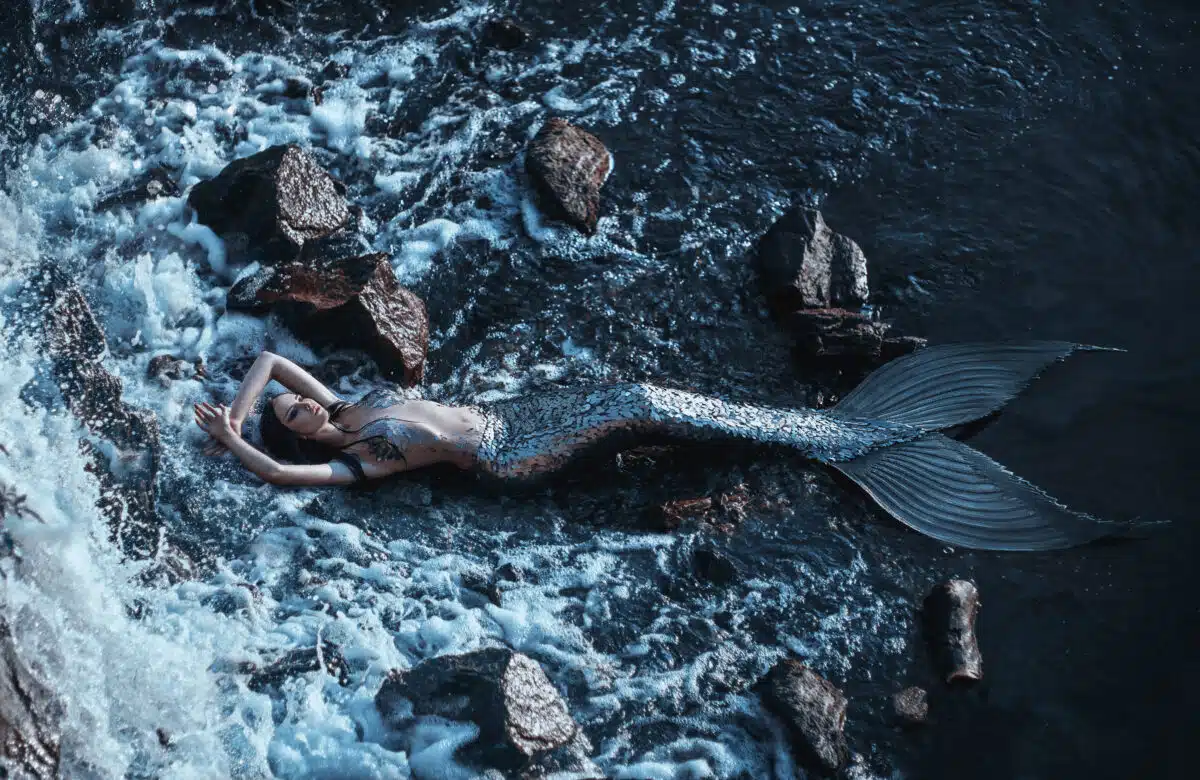
“Hence Away, You Sirens” by George Wither
Hence away, you Sirens, leave me,
And unclasp your wanton arms;
Sug’red words shall ne’er deceive me
Though you prove a thousand charms.
Fie, fie, forbear;
No common snare
Could ever my affection chain;
Your painted baits
And poor deceits
Are all bestowed on me in vain.
I’m no slave to such as you be;
Neither shall a snowy breast,
Wanton eye, or lip of ruby
Ever rob me of my rest;
Go, go, display
Your beauty’s ray
To some o’ersoon enamoured swain:
Those common wiles
Of sighs and smiles
Are all bestowed on me in vain.
I have elsewhere vowed a duty;
Turn away your tempting eyes,
Show not me a naked beauty,
Those impostures I despise;
My spirit loathes
Where gaudy clothes
And feignèd oaths may love obtain:
I love her so
Whose look swears no,
That all your labours will be vain.
Can he prize the tainted posies
Which on every breast are worn,
That may pluck the spotless roses
From their never-touchèd thorn?
I can go rest
On her sweet breast
That is the pride of Cynthia’s train;
Then stay your tongues,
Your mermaid songs
Are all bestowed on me in vain.
He’s a fool that basely dallies
Where each peasant mates with him;
Shall I haunt the throngèd vallies,
Whilst there’s noble hills to climb?
No, no, though clowns
Are scared with frowns,
I know the best can but disdain:
And those I’ll prove,
So shall your love
Be all bestowed on me in vain.
Yet I would not deign embraces
With the greatest-fairest she
If another shared those graces
Which had been bestowed on me.
I gave that one
My love, where none
Shall come to rob me of my gain.
Your fickle hearts
Makes tears, and arts
And all, bestowed on me in vain.
I do scorn to vow a duty
Where each lustful lad may woo;
Give me her, whose sun-like beauty
Buzzards dare not soar unto:
She, she it is
Affords that bliss,
For which I would refuse no pain;
But such as you,
Fond fools, adieu,
You seek to captive me in vain.
Proud she seemed in the beginning
And disdained my looking on,
But that coy one in the winning,
Proves a true one, being won.
Whate’er betide
She’ll ne’er divide
The favour she to me shall deign;
But your fond love
Will fickle prove,
And all that trust in you are vain.
Therefore know, when I enjoy one,
And for love employ my breath,
She I court shall be a coy one
Though I win her with my death.
A favour there
Few aim at dare;
And if, perhaps, some lover plain;
She is not won
Nor I undone
By placing of my love in vain.
Leave me, then, you Sirens, leave me,
Seek no more to work my harms,
Crafty wiles cannot deceive me,
Who am proof against your charms:
You labour may
To lead astray
The heart that constant shall remain;
And I the while
Will sit and smile
To see you spend your time in vain.
“”Farewell” is on my tongue” (William Roger Paton, Translator) by Paulus Silentarius
“Farewell” is on my tongue, but I hold in the word with a wrench and still abide near thee. For I shudder at this horrid parting as at the bitter night of hell. Indeed thy light is like the daylight; but that is mute, while thou bringest me that talk, sweeter than the Sirens, on which all my soul’s hopes hang.
“Aspiration” by Henrietta Cordelia Ray
We climb the slopes of life with throbbing heart,
And eager pulse, like children toward a star.
Sweet siren music cometh from afar,
To lure us on meanwhile. Responsive start
The nightingales to richer song than Art
Can ever teach. No passing shadows mar
Awhile the dewy skies; no inner jar
Of conflict bids us with our quest to part.
We see adown the distance, rainbow-arched,
What melting aisles of liquid light and bloom!
We hasten, tremulous, with lips all parched,
And eyes wide-stretched, nor dream of coming gloom.
Enough that something held almost divine
Within us ever stirs. Can we repine?
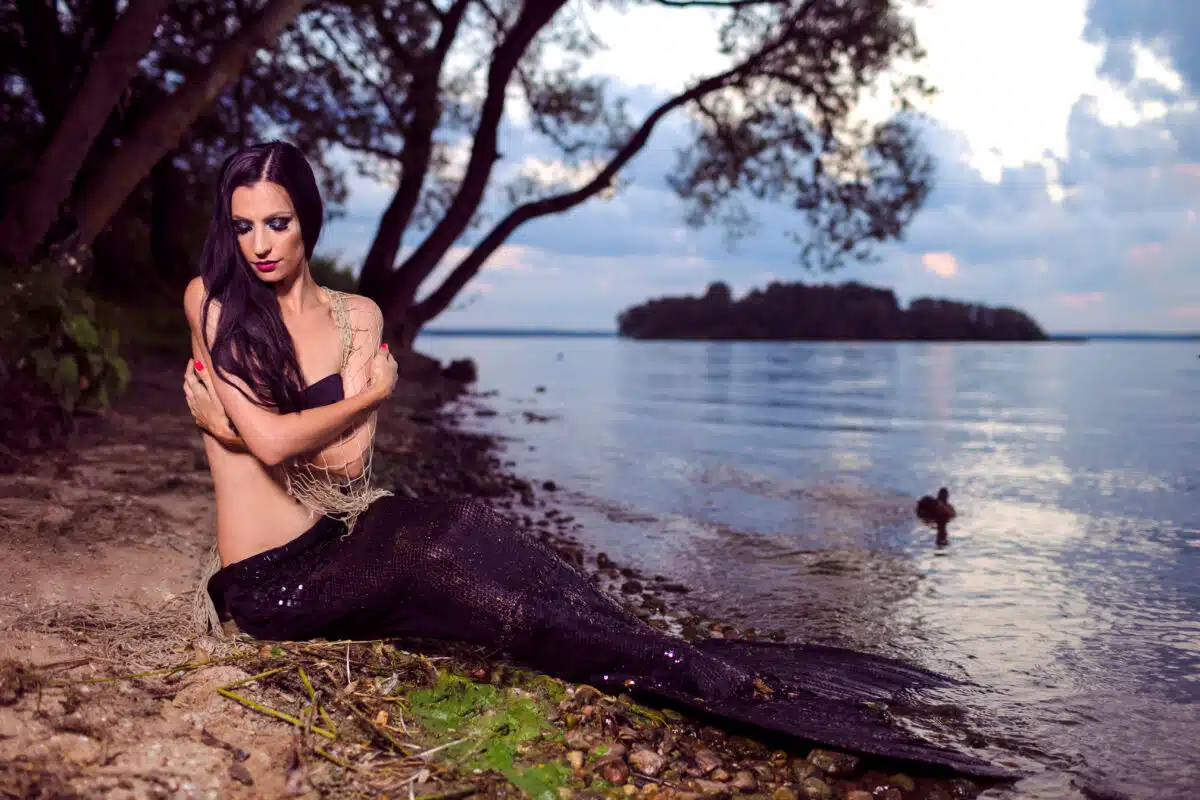
“What potions have I drunk of Siren tears (Sonnet 119)” by William Shakespeare
What potions have I drunk of Siren tears,
Distill’d from limbecks foul as hell within,
Applying fears to hopes and hopes to fears,
Still losing when I saw myself to win!
What wretched errors hath my heart committed,
Whilst it hath thought itself so blessed never!
How have mine eyes out of their spheres been fitted
In the distraction of his madding fever!
O benefit of ill! now I find true
That better is by evil still made better;
And ruin’d love, when it is build anew,
Grows fairer than at first, more strong, far greater.
So I return rebuked to my content
And gain by ills thrice more than I have spent.
“The Water Lady” by Thomas Hood
To show what man should never see!-
I saw a maiden on a stream,
And fair was she!
I staid awhile, to see her throw
Her tresses black, that all beset
The fair horizon of her brow
With clouds of jet.
I staid a little while to view
Her cheek, that wore in place of red
The bloom of water, tender blue,
Daintily spread.
I staid to watch, a little space,
Her parted lips if she would sing;
The waters closed above her face
With many a ring.
And still I staid a little more,
Alas! she never comes again!
I throw my flowers from the shore,
And watch in vain.
I know my life will fade away,
I know that I must vainly pine,
For I am made of mortal clay,
But she’s divine!
